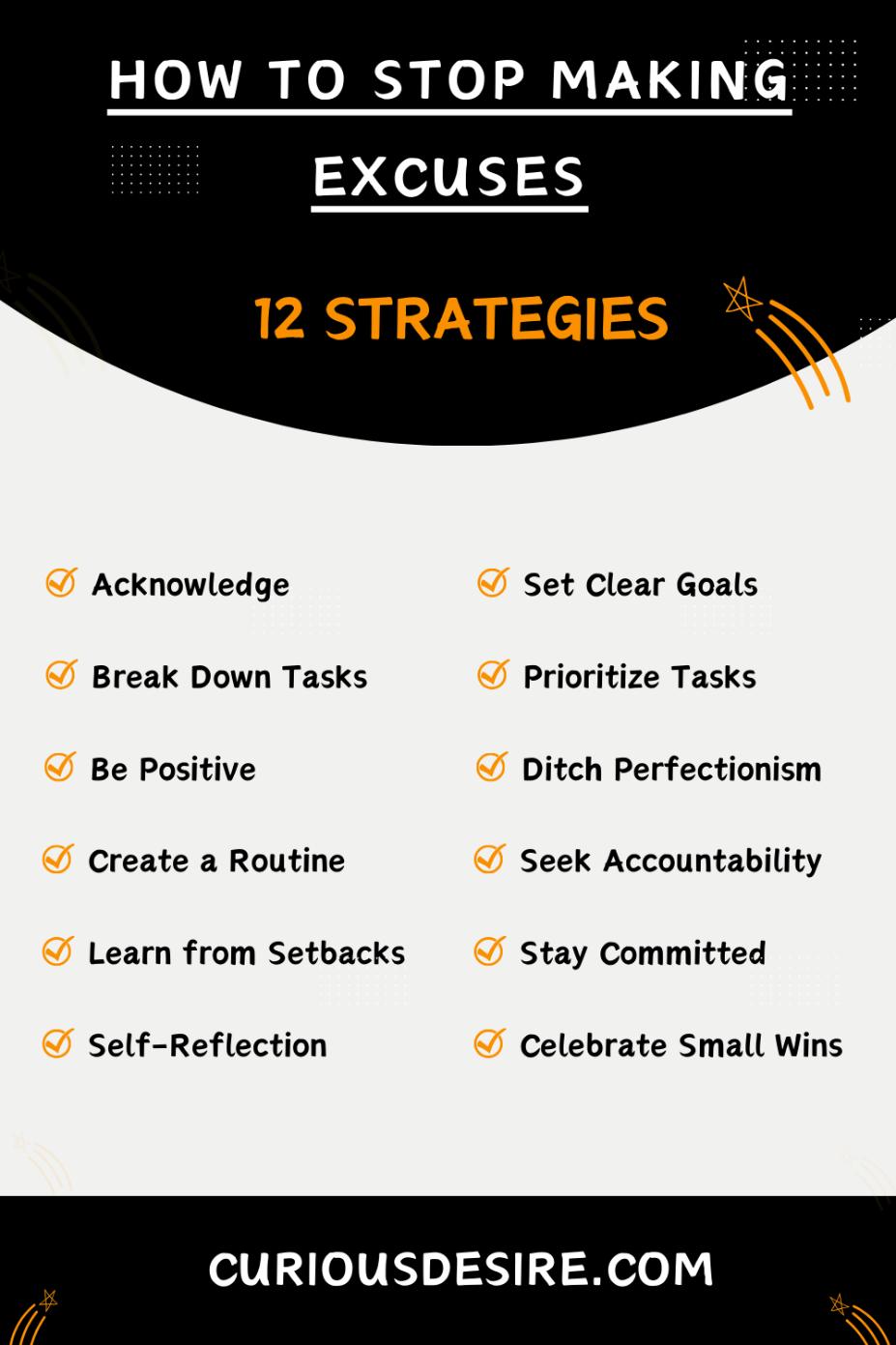In the journey towards personal growth and achievement, we often encounter a familiar roadblock – the habit of making excuses.
Excuses can act as subtle barriers that prevent us from reaching our full potential and realizing our goals.
Whether it’s avoiding a challenging task, procrastinating on important projects, or sidestepping responsibilities, excuses can become a hindrance to progress.
In this guide, we will explore effective strategies to break free from the cycle of excuse-making and empower ourselves to take control of our actions.
Here are the top 5 actionable strategies on how to stop making excuses:
- Set Clear Goals
- Develop a Growth Mindset
- Create Accountability Systems
- Eliminate Negative Self-Talk
- Build a Routine and Habits
[toc]

1. Acknowledge the Excuses
An often overlooked aspect of human personality that leads individuals to make excuses is the failure to acknowledge the excuses they make.
It sets off a cycle of denial where one overlooks the role of avoiding responsibilities. The cycle starts when individuals make excuses but fail to see or admit that they are doing so.
This lack of self-awareness prevents them from understanding their contribution to a situation
For instance, someone might consistently avoid a challenging task and attribute it to external factors, such as lack of time or resources, without realizing that their own choices play a role.
On the other hand, acknowledging excuses is crucial for personal development. When a person recognizes their tendency to make excuses, it opens the door to self-awareness.
Acknowledging excuses allows one to take a closer look at the actions and understand the underlying reasons behind the avoidance of certain tasks.
This self-awareness is a powerful tool for learning from failures, as it enables individuals to break free from the cycle of denial and take responsibility for their choices.
2. Set Clear Goals
Without clear goals, individuals may find it challenging to stay focused, leading to a higher likelihood of making excuses. When there is no clear direction or purpose, it becomes easier to rationalize procrastination or avoid tasks altogether.
For instance, if someone sets a vague goal like “I want to exercise more,” without defining specific targets, they might find themselves making excuses like being too tired or having too little time.
Setting clear goals provides a roadmap for action. It establishes a clear path forward, making it harder to justify excuses. When individuals have specific, measurable objectives, they can better prioritize their efforts and allocate time effectively.
3. Break Down Tasks
Failing to break tasks into smaller, manageable steps often makes people feel overwhelmed, leading to excuses. When you have a complicated task, it’s hard to know where to start, and that makes it easy to find reasons not to do it.
For instance, imagine someone who doesn’t want to begin a big project. They might say it’s too massive, so they keep delaying it. However, if they broke it down into smaller parts, it would be more doable.
Breaking down tasks makes them easier to approach, simplifying the process and giving a clear starting point. This makes it harder to make excuses based on thinking the whole task is too difficult.
4. Prioritize Tasks
Neglecting to prioritize tasks can create a chaotic and disorganized environment, making it easier to use confusion as an excuse.
Without setting priorities, individuals may struggle to decide which tasks are most crucial, leading to procrastination or avoidance.
For example, someone who fails to prioritize their workload might claim they didn’t know where to start when confronted with an unfinished project.
However, when set your priorities, there is a clear understanding of what needs immediate attention, making it more challenging to justify putting off important responsibilities.
5. Develop a Positive Mindset
Negative thoughts and mindsets often become a breeding ground for excuses. When individuals view challenges pessimistically, they are more likely to find reasons to avoid taking action.
Someone with a negative mindset might use phrases like “I can’t” or “It’s too difficult” as excuses for not attempting a new task. However, developing a positive mindset involves reframing negative thoughts into constructive ones.
By adopting an optimistic outlook, individuals can approach challenges with a can-do attitude, reducing the inclination to make excuses based on fear or self-doubt.
Stop Making Excuses – FAQs
1. Why do I keep making excuses?
People often give excuses as a defense mechanism to protect their self-esteem or to avoid taking responsibility for their actions.
It can be rooted in fear of failure, fear of judgment, or a desire to maintain a positive self-image.
2. What is the psychology behind excuses?
The psychology of excuses is complex and can involve cognitive biases, such as self-serving bias, where individuals attribute positive events to their own character but attribute negative events to external factors.
Excuses may also be a way to cope with cognitive dissonance, helping individuals reconcile conflicting beliefs or actions.
3. How do you get over excuses?
Getting over excuses involves self-awareness, accountability, and a willingness to face challenges.
Setting clear goals, breaking them into manageable tasks, and developing a proactive mindset can help overcome the tendency to make excuses.
4. Why am I so good at making excuses?
Being good at making excuses may stem from a habit of avoiding discomfort, fear of failure, or a lack of self-discipline.
Identifying the root cause and working on building resilience and discipline can help break the pattern.
5. What is a person who always makes excuses called?
A person who consistently makes excuses is often referred to as an “excuse-maker” or someone with a “victim mentality.”
This behavior may be indicative of a lack of accountability and a tendency to externalize responsibility.
6. What are the negative effects of excuses?
Excuses can lead to a lack of personal growth, strained relationships, and missed opportunities.
They may contribute to a negative self-image and hinder one’s ability to learn from mistakes or setbacks.
7. What are the three types of excuses?
- External Excuses: Blaming external factors like circumstances, other people, or luck.
- Internal Excuses: Blaming personal characteristics or limitations.
- Philosophical Excuses: Justifying actions based on a belief system or personal philosophy.
8. What are the benefits of no excuses?
Living a life without excuses promotes personal responsibility, accountability, and resilience.
It can lead to increased self-confidence, improved relationships, and a greater likelihood of achieving goals.
9. Is it OK to make excuses?
While it’s understandable to make occasional excuses, relying on them consistently can hinder personal growth.
It’s important to recognize when excuses are preventing progress and work towards overcoming them.
10. Is anxiety real or just an excuse?
Anxiety is a real and valid mental health condition. It is not merely an excuse but a complex set of emotions and physiological responses that can significantly impact a person’s well-being.
Seeking professional help is crucial for managing anxiety.
11. How do I stop being lazy and making excuses?
To stop being lazy and making excuses, set clear goals, create a realistic plan, break tasks into smaller steps, and develop a routine.
Cultivate self-discipline, practice positive self-talk, and seek support from friends or mentors.
12. Is it OK to make excuses?
While making occasional excuses is normal, relying on them consistently can hinder personal growth.
It’s crucial to be mindful of when excuses are preventing progress and take steps to address the underlying issues.


